The Hilliker Curse: My Pursuit of Women
The legendary crime writer gives us a raw, brutally candid memoir—as high intensity and as riveting as any of his novels—about his obsessive search for “atonement in women.”\ The year was 1958. Jean Hilliker had divorced her fast-buck hustler husband and resurrected her maiden name. Her son, James, was ten years old. He hated and lusted after his mother and “summoned her dead.” She was murdered three months later.\ \ The Hilliker Curse is a predator’s confession, a treatise on guilt and on...
Search in google:
The legendary crime writer gives us a raw, brutally candid memoir—as high intensity and as riveting as any of his novels—about his obsessive search for “atonement in women.”The year was 1958. Jean Hilliker had divorced her fast-buck hustler husband and resurrected her maiden name. Her son, James, was ten years old. He hated and lusted after his mother and “summoned her dead.” She was murdered three months later.The Hilliker Curse is a predator’s confession, a treatise on guilt and on the power of malediction, and above all, a cri de cœur. James Ellroy unsparingly describes his shattered childhood, his delinquent teens, his writing life, his love affairs and marriages, his nervous breakdown, and the beginning of a relationship with an extraordinary woman who may just be the long-sought Her. A layered narrative of time and place, emotion and insight, sexuality and spiritual quest, The Hilliker Curse is a brilliant, soul-baring revelation of self. It is unlike any memoir you have ever read. Publishers Weekly Ellroy’s narration of his memoir of how his mother’s brutal rape and murder molded him sexually and psychically is as utterly distinctive as anything as he has done. Full of vim and vigor, this reading is a bit like mad beat poetry, as staccato sentences, wild almost jazz styling (a low-cut dress reveals “boooo-coop back”) take sentences in unfailingly entertaining if unintentionally hilarious directions. It’s dark stuff Ellroy is relating—his early Peeping Tom proclivities, for example—but his odd emphases, the way he trumpets small, unimportant facts as if there were a big reveal (“He sold Buicks! She bought a red and white sedan!”) elicits more laughter than the writer perhaps intended. A Knopf hardcover. (Sept)
1\ The numbers don't matter. It's not a body count, a scratchpad list or a boast. Statistics obscure intent and meaning. My toll is therefore ambiguous. Girlfriends, wives, one-night stands, paid companions. Chaste early figures. A high-stat blitz later on. Quantity means shit in my case. Culminated contact means less than that. I was a watcher at the get-go. Visual access meant capture. The Curse incubated my narrative gift. My voyeur's eye pre-honed it. I lived a kiddie version of my twisted heroes thirty years hence.\ We're looking. We're eyeball-arched and orbing in orbit. We're watching women. We want something enormous. My heroes don't know it yet. Their virginal creator has not a clue. We don't know that we're reading personae. We're looking so that we can stop looking. We crave the moral value of one woman. We'll know Her when we see Her. In the meantime, we'll look.\ A document denotes my early fixation. It's dated 2/17/55. It predates The Curse by three years. It's a playground shot in Kodak black & white.\ A jungle gym, two slides and a sandbox clutter the foreground. I'm standing alone, stage left. I'm lurchlike big and unkempt. My upheaval is evident. A stranger would mark me as a fucked-up child in everyday duress. I have beady eyes. They're fixed on four girls, huddled stage right. The photo is rife with objects and children in lighthearted movement. I'm coiled in pure study. My scrutiny is staggeringly intense. I'll re-read my mind from 55 years back.\ These four girls bode as The Other. I'm a pious Lutheran boy. There can be only one. Is it her, her, her or Her?\ I think my mother took the picture. A neutral parent would have cropped out the freako little boy. Jean Hilliker at 39: the pale skin and red hair, center- parted and tied back--my features and fierce eyes and a sure grace that I have never possessed.\ The photo is a windowsill carving. I was still too young to roam unfettered and press my face up to the glass. My parents split the sheets later that year. Jean Hilliker got primary custody. She put my dad on skates and rolled him to a cheap pad a few blocks away. I snuck out for quick visits. High shrubs and drawn shades blocked my views en route. My mother told me that my father was spying on her. She sensed it. She said she saw smudge marks on her bedroom window. I read the divorce file years later. My father copped out to peeping. He said he peeped to indict my mother's indigenous moral sloth.\ He saw her having sex with a man. It did not legally justify his presence at her window. Windows were beacons. I knew it in my crazed-child rush to The Curse. I entered houses through windows a decade hence. I never left smudge marks. My mother and father taught me that.\ She had the stones. He had the bunco-artist gab and the grin. She always worked. He dodged work and schemed like Sergeant Bilko and the Kingfish on Amos 'n' Andy. The pastor at my church called him the "world's laziest white man." He had a sixteen-inch schlong. It dangled out of his shorts. All his friends talked about it. This is not a whacked-out child's reconstruction.\ Jean Hilliker got bourbon-bombed and blasted the Brahms concertos. Armand Ellroy subscribed to scandal rags and skin magazines. I got two days a week with him. He let me stare out his front window and fuck with his binoculars. My ninth birthday arrived. My mother got me a new church suit. My dad asked me what I...
\ Library JournalIn his second memoir, Ellroy (L.A. Confidential) attempts to dispel a curse that began with the murder of his mother, Jean Hilliker, when he was ten years old, which is more thoroughly explored in his previous memoir, My Dark Places. His mother's murder came three months after he had wished her dead. That he should have behavioral challenges and issues with guilt is understandable. Ellroy's own curse, readers learn, is his inability to develop stable, long-term, and meaningful relationships with women; he writes here of seeking to dispel that curse. In short, punchy sentences, with lurid detail, Ellroy describes his many—ultimately doomed—relationships and marriages in his search for her, the woman with whom he is destined to be. In the course of his search, he leaves a path of destruction, which, along with his self-realization, is what this book is about. VERDICT Recommended for readers who enjoy introspective, edgy memoirs and for fans of Ellroy.—Mark Alan Williams Manivong, Library of Congress\ \ \ \ \ Kirkus ReviewsNoted crime writer Ellroy (Blood's a Rover, 2009, etc.) presents a sharp-tongued, acidic memoir of his life and loves.\ The author's loose-living mother, Jean Hilliker, has figured deeply in his previous work—one need only readThe Black Dahlia (1987); his father less so, and Ellroy paints him memorably: "He had the bunco-artist gab and the grin...He dodged work and schemed like Sergeant Bilko and the "Kingfish" on Amos & Andy. The pastor at my church called him 'the world's laziest white man.' He had a sixteen-inch schlong. It dangled out of his shorts. All his friends talked about it. This is not a wacked-out children's reconstruction." That's a volatile combination sure to leave marks on a young boy's psyche, but it's the mother's curse—to say just what it is would steal some of Ellroy's thunder—that really does him in. The author's '50s is not that ofLeave It to Beaver—not with Dad and Mom setting the examples. By the time he was 13, Ellroy was chugging cheap wine, peeping into windows and reading deeply into warlock-haunted literature that "formally sanctioned me to lie still and conjure women." Ah, and the women he conjured. There's Susan, who swigged cough syrup and downed stolen pills with him ("we talked classical music shit endlessly"); Charlotte (who "thought I drank too much"); Helen ("I lacked her omnivorous view of the world in all its lively flux. She lacked my brutal will"; and...well, a lot of ands, remembered over half a century in this Nabokovian exercise in time travel, with confessions of vice and addiction and, mostly, half-truths told and believed. It's vintage Ellroy, full of bile and invective and utterly unsparing to anyone—including the author himself, who manages to let slip away most of the good things he finds and spends a few fortunes in the bargain, yet keeps on plugging.\ A fervent portrait of the artist as a young screw-up—an old one, too, who writes like an avenging angel.\ \ \ \ Publishers WeeklyEllroy’s narration of his memoir of how his mother’s brutal rape and murder molded him sexually and psychically is as utterly distinctive as anything as he has done. Full of vim and vigor, this reading is a bit like mad beat poetry, as staccato sentences, wild almost jazz styling (a low-cut dress reveals “boooo-coop back”) take sentences in unfailingly entertaining if unintentionally hilarious directions. It’s dark stuff Ellroy is relating—his early Peeping Tom proclivities, for example—but his odd emphases, the way he trumpets small, unimportant facts as if there were a big reveal (“He sold Buicks! She bought a red and white sedan!”) elicits more laughter than the writer perhaps intended. A Knopf hardcover. (Sept)\ \ \ \ \ Library JournalWhen crime writer Ellroy was ten, his mother was murdered, an event he explored in depth in My Dark Places (1996). In this follow-up memoir he focuses on how his mother's tragic death may have jinxed his relations with women, recounted in details not always flattering to the author. He also touches on numerous other topics, including classical music, dogs, and religion. While far from a polished reader, Ellroy brings his highly eccentric character to the fore, alternating between a straightforward performance and incantations that both serve to celebrate his excesses and exorcise his many demons. No one says, "I brooded" with quite the intensity he brings. Essential for Ellroy fans and of considerable interest to those attempting to comprehend the mysteries of male-female relationships, though definitely not for strict adherents to political correctness. [The Knopf hc was recommended "for readers who enjoy introspective, edgy memoirs," LJ 9/15/10.—Ed.]—Michael Adams, CUNY Graduate Ctr. Lib.\ \








